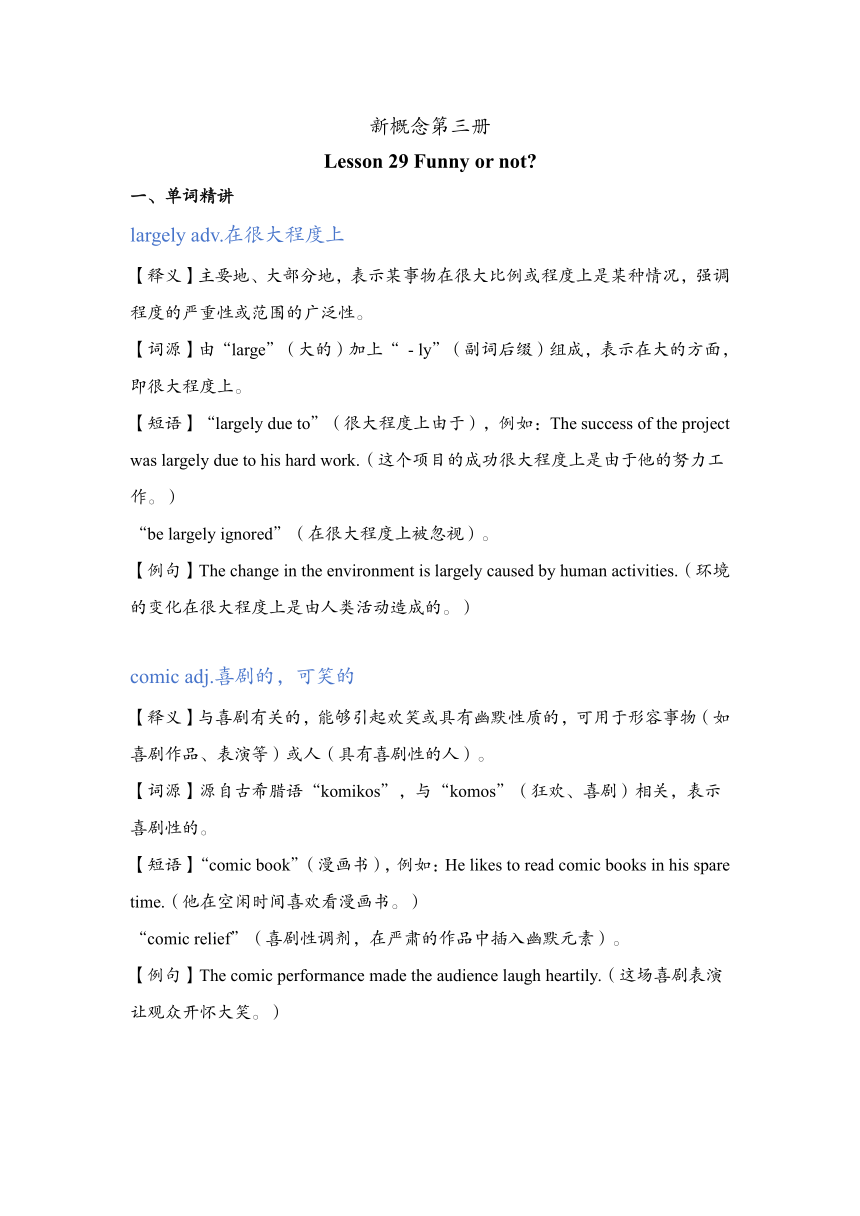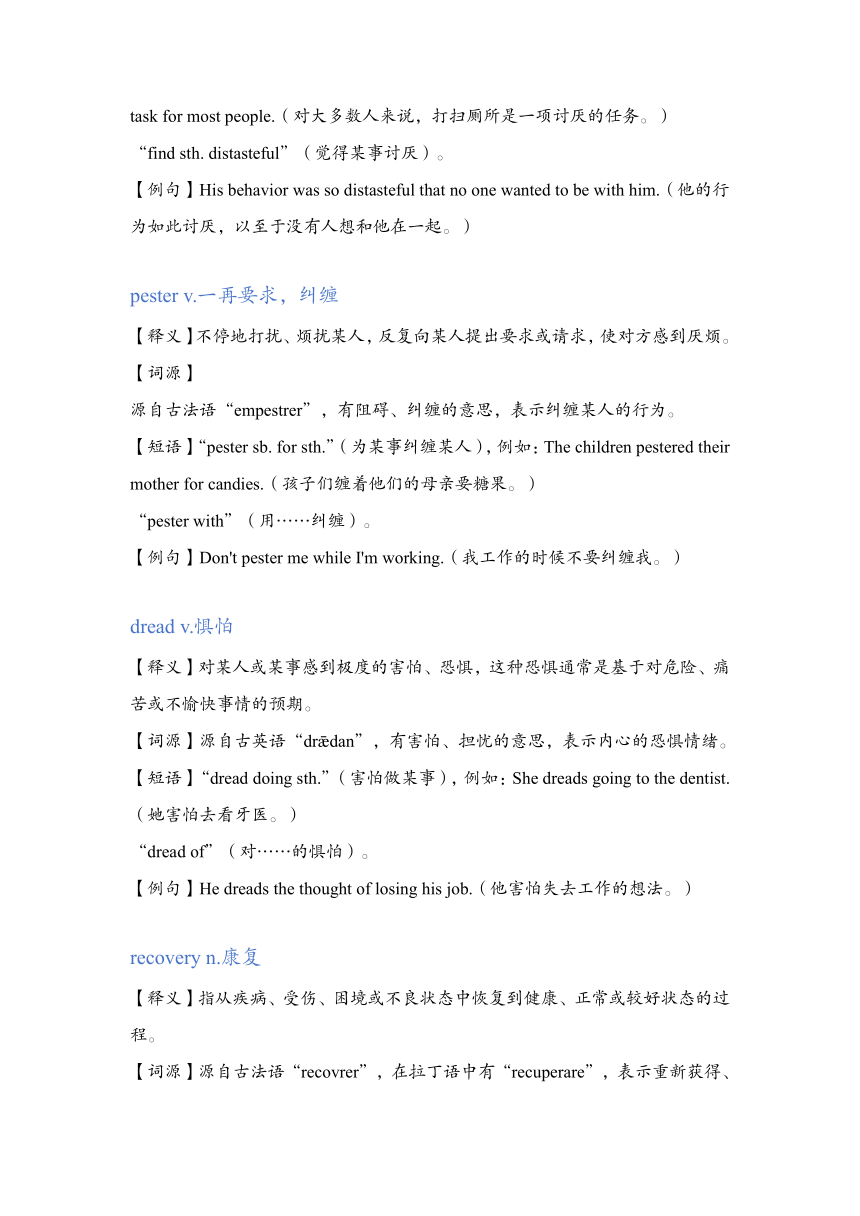新概念第三册Lesson 29 Funny or not讲义
文档属性
| 名称 | 新概念第三册Lesson 29 Funny or not讲义 |  | |
| 格式 | docx | ||
| 文件大小 | 294.1KB | ||
| 资源类型 | 教案 | ||
| 版本资源 | 新概念英语 | ||
| 科目 | 英语 | ||
| 更新时间 | 2024-12-04 17:14:45 | ||
图片预览




文档简介
新概念第三册
Lesson 29 Funny or not
单词精讲
largely adv.在很大程度上
【释义】主要地、大部分地,表示某事物在很大比例或程度上是某种情况,强调程度的严重性或范围的广泛性。
【词源】由“large”(大的)加上“ - ly”(副词后缀)组成,表示在大的方面,即很大程度上。
【短语】“largely due to”(很大程度上由于),例如:The success of the project was largely due to his hard work.(这个项目的成功很大程度上是由于他的努力工作。)
“be largely ignored”(在很大程度上被忽视)。
【例句】The change in the environment is largely caused by human activities.(环境的变化在很大程度上是由人类活动造成的。)
comic adj.喜剧的,可笑的
【释义】与喜剧有关的,能够引起欢笑或具有幽默性质的,可用于形容事物(如喜剧作品、表演等)或人(具有喜剧性的人)。
【词源】源自古希腊语“komikos”,与“komos”(狂欢、喜剧)相关,表示喜剧性的。
【短语】“comic book”(漫画书),例如:He likes to read comic books in his spare time.(他在空闲时间喜欢看漫画书。)
“comic relief”(喜剧性调剂,在严肃的作品中插入幽默元素)。
【例句】The comic performance made the audience laugh heartily.(这场喜剧表演让观众开怀大笑。)
universal adj. 普通的
【释义】普遍存在的、广泛适用的,涉及到所有人、所有事物或整个世界的,没有特殊限制或例外的。
【词源】源自古法语“universel”,在拉丁语中有“universalis”,与“unus”(一)和“versus”(转向)相关,表示转向一体的、普遍的。
【短语】“universal truth”(普遍真理),例如:Mathematical principles are considered universal truths.(数学原理被认为是普遍真理。)
“universal language”(通用语言)。
【例句】Love is a universal feeling among human beings.(爱是人类之间普遍存在的一种情感。)
comedian n.滑稽演员,喜剧演员
【释义】以表演喜剧、滑稽剧或幽默节目为职业的人,他们通过语言、动作、表情等方式来制造笑料,娱乐观众。
【词源】由“comedy”(喜剧)加上“ - ian”(表示人)后缀组成,表示从事喜剧表演的人。
【短语】“famous comedian”(著名喜剧演员),例如:Charlie Chaplin was a famous comedian.(查理·卓别林是一位著名的喜剧演员。)
“stand - up comedian”(单口喜剧演员)。
【例句】The comedian's jokes were very funny.(这位喜剧演员的笑话非常有趣。)
distasteful adj.讨厌的
【释义】令人不愉快的、引起反感的,形容事物的性质或特征使人产生厌恶、不喜欢的感觉。
【词源】由“dis - ”(否定前缀)和“tasteful”(有品味的、令人愉快的)组成,表示没有品味的、令人讨厌的。
【短语】“distasteful task”(讨厌的任务),例如:Cleaning the toilet is a distasteful task for most people.(对大多数人来说,打扫厕所是一项讨厌的任务。)
“find sth. distasteful”(觉得某事讨厌)。
【例句】His behavior was so distasteful that no one wanted to be with him.(他的行为如此讨厌,以至于没有人想和他在一起。)
pester v.一再要求,纠缠
【释义】不停地打扰、烦扰某人,反复向某人提出要求或请求,使对方感到厌烦。
【词源】
源自古法语“empestrer”,有阻碍、纠缠的意思,表示纠缠某人的行为。
【短语】“pester sb. for sth.”(为某事纠缠某人),例如:The children pestered their mother for candies.(孩子们缠着他们的母亲要糖果。)
“pester with”(用……纠缠)。
【例句】Don't pester me while I'm working.(我工作的时候不要纠缠我。)
dread v.惧怕
【释义】对某人或某事感到极度的害怕、恐惧,这种恐惧通常是基于对危险、痛苦或不愉快事情的预期。
【词源】源自古英语“dr dan”,有害怕、担忧的意思,表示内心的恐惧情绪。
【短语】“dread doing sth.”(害怕做某事),例如:She dreads going to the dentist.(她害怕去看牙医。)
“dread of”(对……的惧怕)。
【例句】He dreads the thought of losing his job.(他害怕失去工作的想法。)
recovery n.康复
【释义】指从疾病、受伤、困境或不良状态中恢复到健康、正常或较好状态的过程。
【词源】源自古法语“recovrer”,在拉丁语中有“recuperare”,表示重新获得、恢复,表示恢复健康或正常状态。
【短语】“economic recovery”(经济复苏),例如:The country is experiencing an economic recovery.(这个国家正在经历经济复苏。)
“recovery period”(恢复期)。
【例句】His recovery from the illness was much faster than expected.(他从疾病中的康复比预期的要快得多。)
plaster n.熟石膏
【释义】一种白色的粉状物质,主要由硫酸钙组成,与水混合后可硬化,常用于建筑(如抹墙)、医疗(如制作石膏绷带)等领域。
【词源】源自古希腊语“emplastron”,表示涂抹、膏药,最初用于医药方面,后用于建筑等领域的类似材料。
【短语】“plaster cast”(石膏绷带、石膏模型),例如:He had to wear a plaster cast on his leg for six weeks.(他的腿必须戴上石膏绷带六周。)
“plaster of Paris”(巴黎石膏,一种优质熟石膏)。
【例句】The workers used plaster to smooth the walls.(工人们用熟石膏来抹墙。)
console v. 安慰,慰问
【释义】给予某人同情、支持或鼓励,以减轻其痛苦、悲伤或失望的情绪。
【词源】源自古法语“consoler”,在拉丁语中有“consolari”,表示安慰、慰藉,表示对他人情绪的安抚。
【短语】“console sb. for sth.”(因某事安慰某人),例如:She consoled her friend for the loss of his pet.(她因朋友失去宠物而安慰他。)
“console oneself”(自我安慰)。
【例句】His kind words consoled her when she was in distress.(当她处于困境时,他亲切的话语安慰了她。)
hobble v.瘸着腿走
【释义】因腿部受伤、残疾或被束缚等原因而走路困难,一瘸一拐地行走。
【词源】源自古英语“hobbelen”,有颠簸、摇晃的意思,用于形容走路不稳、瘸着腿走的样子。
【短语】“hobble along”(瘸着腿慢慢走),例如:The injured dog hobbled along the street.(受伤的狗瘸着腿沿着街道慢慢走。)
【例句】He hobbled over to the chair after spraining his ankle.(他扭伤脚踝后瘸着腿走向椅子。)
compensate v.补偿
【释义】对某人因遭受损失、伤害或不便而给予弥补,通常是通过提供某种形式的赔偿(如金钱、服务等)。
【词源】源自古法语“compensacion”,在拉丁语中有“compensare”,表示权衡、补偿,表示对损失等进行弥补。
【短语】“compensate for”(补偿……),例如:The insurance company will compensate for the damage to your car.(保险公司将补偿你汽车的损坏。)
“compensate sb. with sth.”(用某物补偿某人)。
【例句】The company will compensate the workers for their extra work.(公司将为工人的额外工作给予补偿。)
mumble v.喃喃而语
【释义】小声地、含糊不清地说话,通常是因为没有清晰地发音或者不想让别人清楚地听到。
【词源】可能是拟声词,模拟含糊不清说话的声音。
【短语】“mumble to oneself”(喃喃自语),例如:He often mumbles to himself when he is thinking.(他在思考的时候经常喃喃自语。)
“mumble about”(含糊地说关于……)。
【例句】The old man mumbled something that no one could understand.(这位老人喃喃地说了些没人能听懂的话。)
二、课文精讲
1.A Frenchman, for instance, might find it hard to laugh at a Russian joke.譬如,法国人听完一则俄国笑话可能很难发笑。
I found it difficult to finish the work in a day.
It was difficult not to be attempted.
2.Most funny stories are based on comic situations.大部分令人发笑的故事都是根据喜剧情节编写的。
be based on:以......作为基础
-- This news report is based entirely on fact. 这篇新闻报导是完全根据实际情况写成的。
3.However, a new type of humour, which stems largely from the U.S., has recently come into fashion.然而,近来一种新式幽默流行了起来,这种幽默主要来自美国。
stem from 源自, 起源于
His feeling of hate stems from envy.
他的仇恨源于嫉妒.
Her interest in flowers stemed from her childhood in the country.
她对花的兴趣源于她在乡下的童年。
stem from 源自, 起源于
= come from 出身于, 由...引起, 是...的结果, 是在...生长大的
= arise from 由...而引起, 由...而产生
= originate from 由某人发起(首创)
Originate vi.发源, 开始, 发生
-- The quarrel originated in a misunderstanding. 争吵是由于误解而引起的。
-- The film originated from a short story. 这部电影取材于一篇短篇小说。
-- They originated the plan. 他们首先提出这一计划。
come into fashion 流行起来, 开始风行
come into power (开始)掌权, 上台
come into being 使产生, 使出现, 建立, 成立
4.In the process, he enjoyed himself thoroughly and kept telling everybody how much he hated hospitals.在晚会上他尽情娱乐,一再告诉大家他是多么讨厌医院。
keep doing sth. 不间断的,不停的做某事
keep on doing sth. 反复、重复干某事(中间可以有短暂的暂停) (keep: vi.)
Don't keep on asking silly questions.
He kept smoking all the while.
He kept on smoking all the while.
keep +宾语+动词ing形式,keep on 不能用于该句型
He kept me waiting for an hour.
I'm sorry to have kept you waiting so long.
how much ----to what extent
How much can I trust him
5.He dreaded having to spend Christmas in hospital.他十分害怕在医院过圣诞。
dread to do = dread doing
6.He spent a miserable day in bed thinking of all the fun he was missing.他在床上郁郁不乐地躺了一天,想着他错过的种种欢乐。
spend time doing sth.
a miserable day: a terrible day
think of:想到,想起,想着
When I saw you I thought of my sister.
think of doing sth.
He is thinking of setting up a school.
7.The following day, however, the doctor consoled him by telling him that his chances of being able to leave hospital in time for New Year celebrations were good.然而,第二天,医生安慰他说,出院欢度新年的可能性还是很大的,
by 通过某种方式手段
I arrived here by train.
his chances of doing sth. are good. / remote 做......可能性极大/极小
Lesson 29 Funny or not
单词精讲
largely adv.在很大程度上
【释义】主要地、大部分地,表示某事物在很大比例或程度上是某种情况,强调程度的严重性或范围的广泛性。
【词源】由“large”(大的)加上“ - ly”(副词后缀)组成,表示在大的方面,即很大程度上。
【短语】“largely due to”(很大程度上由于),例如:The success of the project was largely due to his hard work.(这个项目的成功很大程度上是由于他的努力工作。)
“be largely ignored”(在很大程度上被忽视)。
【例句】The change in the environment is largely caused by human activities.(环境的变化在很大程度上是由人类活动造成的。)
comic adj.喜剧的,可笑的
【释义】与喜剧有关的,能够引起欢笑或具有幽默性质的,可用于形容事物(如喜剧作品、表演等)或人(具有喜剧性的人)。
【词源】源自古希腊语“komikos”,与“komos”(狂欢、喜剧)相关,表示喜剧性的。
【短语】“comic book”(漫画书),例如:He likes to read comic books in his spare time.(他在空闲时间喜欢看漫画书。)
“comic relief”(喜剧性调剂,在严肃的作品中插入幽默元素)。
【例句】The comic performance made the audience laugh heartily.(这场喜剧表演让观众开怀大笑。)
universal adj. 普通的
【释义】普遍存在的、广泛适用的,涉及到所有人、所有事物或整个世界的,没有特殊限制或例外的。
【词源】源自古法语“universel”,在拉丁语中有“universalis”,与“unus”(一)和“versus”(转向)相关,表示转向一体的、普遍的。
【短语】“universal truth”(普遍真理),例如:Mathematical principles are considered universal truths.(数学原理被认为是普遍真理。)
“universal language”(通用语言)。
【例句】Love is a universal feeling among human beings.(爱是人类之间普遍存在的一种情感。)
comedian n.滑稽演员,喜剧演员
【释义】以表演喜剧、滑稽剧或幽默节目为职业的人,他们通过语言、动作、表情等方式来制造笑料,娱乐观众。
【词源】由“comedy”(喜剧)加上“ - ian”(表示人)后缀组成,表示从事喜剧表演的人。
【短语】“famous comedian”(著名喜剧演员),例如:Charlie Chaplin was a famous comedian.(查理·卓别林是一位著名的喜剧演员。)
“stand - up comedian”(单口喜剧演员)。
【例句】The comedian's jokes were very funny.(这位喜剧演员的笑话非常有趣。)
distasteful adj.讨厌的
【释义】令人不愉快的、引起反感的,形容事物的性质或特征使人产生厌恶、不喜欢的感觉。
【词源】由“dis - ”(否定前缀)和“tasteful”(有品味的、令人愉快的)组成,表示没有品味的、令人讨厌的。
【短语】“distasteful task”(讨厌的任务),例如:Cleaning the toilet is a distasteful task for most people.(对大多数人来说,打扫厕所是一项讨厌的任务。)
“find sth. distasteful”(觉得某事讨厌)。
【例句】His behavior was so distasteful that no one wanted to be with him.(他的行为如此讨厌,以至于没有人想和他在一起。)
pester v.一再要求,纠缠
【释义】不停地打扰、烦扰某人,反复向某人提出要求或请求,使对方感到厌烦。
【词源】
源自古法语“empestrer”,有阻碍、纠缠的意思,表示纠缠某人的行为。
【短语】“pester sb. for sth.”(为某事纠缠某人),例如:The children pestered their mother for candies.(孩子们缠着他们的母亲要糖果。)
“pester with”(用……纠缠)。
【例句】Don't pester me while I'm working.(我工作的时候不要纠缠我。)
dread v.惧怕
【释义】对某人或某事感到极度的害怕、恐惧,这种恐惧通常是基于对危险、痛苦或不愉快事情的预期。
【词源】源自古英语“dr dan”,有害怕、担忧的意思,表示内心的恐惧情绪。
【短语】“dread doing sth.”(害怕做某事),例如:She dreads going to the dentist.(她害怕去看牙医。)
“dread of”(对……的惧怕)。
【例句】He dreads the thought of losing his job.(他害怕失去工作的想法。)
recovery n.康复
【释义】指从疾病、受伤、困境或不良状态中恢复到健康、正常或较好状态的过程。
【词源】源自古法语“recovrer”,在拉丁语中有“recuperare”,表示重新获得、恢复,表示恢复健康或正常状态。
【短语】“economic recovery”(经济复苏),例如:The country is experiencing an economic recovery.(这个国家正在经历经济复苏。)
“recovery period”(恢复期)。
【例句】His recovery from the illness was much faster than expected.(他从疾病中的康复比预期的要快得多。)
plaster n.熟石膏
【释义】一种白色的粉状物质,主要由硫酸钙组成,与水混合后可硬化,常用于建筑(如抹墙)、医疗(如制作石膏绷带)等领域。
【词源】源自古希腊语“emplastron”,表示涂抹、膏药,最初用于医药方面,后用于建筑等领域的类似材料。
【短语】“plaster cast”(石膏绷带、石膏模型),例如:He had to wear a plaster cast on his leg for six weeks.(他的腿必须戴上石膏绷带六周。)
“plaster of Paris”(巴黎石膏,一种优质熟石膏)。
【例句】The workers used plaster to smooth the walls.(工人们用熟石膏来抹墙。)
console v. 安慰,慰问
【释义】给予某人同情、支持或鼓励,以减轻其痛苦、悲伤或失望的情绪。
【词源】源自古法语“consoler”,在拉丁语中有“consolari”,表示安慰、慰藉,表示对他人情绪的安抚。
【短语】“console sb. for sth.”(因某事安慰某人),例如:She consoled her friend for the loss of his pet.(她因朋友失去宠物而安慰他。)
“console oneself”(自我安慰)。
【例句】His kind words consoled her when she was in distress.(当她处于困境时,他亲切的话语安慰了她。)
hobble v.瘸着腿走
【释义】因腿部受伤、残疾或被束缚等原因而走路困难,一瘸一拐地行走。
【词源】源自古英语“hobbelen”,有颠簸、摇晃的意思,用于形容走路不稳、瘸着腿走的样子。
【短语】“hobble along”(瘸着腿慢慢走),例如:The injured dog hobbled along the street.(受伤的狗瘸着腿沿着街道慢慢走。)
【例句】He hobbled over to the chair after spraining his ankle.(他扭伤脚踝后瘸着腿走向椅子。)
compensate v.补偿
【释义】对某人因遭受损失、伤害或不便而给予弥补,通常是通过提供某种形式的赔偿(如金钱、服务等)。
【词源】源自古法语“compensacion”,在拉丁语中有“compensare”,表示权衡、补偿,表示对损失等进行弥补。
【短语】“compensate for”(补偿……),例如:The insurance company will compensate for the damage to your car.(保险公司将补偿你汽车的损坏。)
“compensate sb. with sth.”(用某物补偿某人)。
【例句】The company will compensate the workers for their extra work.(公司将为工人的额外工作给予补偿。)
mumble v.喃喃而语
【释义】小声地、含糊不清地说话,通常是因为没有清晰地发音或者不想让别人清楚地听到。
【词源】可能是拟声词,模拟含糊不清说话的声音。
【短语】“mumble to oneself”(喃喃自语),例如:He often mumbles to himself when he is thinking.(他在思考的时候经常喃喃自语。)
“mumble about”(含糊地说关于……)。
【例句】The old man mumbled something that no one could understand.(这位老人喃喃地说了些没人能听懂的话。)
二、课文精讲
1.A Frenchman, for instance, might find it hard to laugh at a Russian joke.譬如,法国人听完一则俄国笑话可能很难发笑。
I found it difficult to finish the work in a day.
It was difficult not to be attempted.
2.Most funny stories are based on comic situations.大部分令人发笑的故事都是根据喜剧情节编写的。
be based on:以......作为基础
-- This news report is based entirely on fact. 这篇新闻报导是完全根据实际情况写成的。
3.However, a new type of humour, which stems largely from the U.S., has recently come into fashion.然而,近来一种新式幽默流行了起来,这种幽默主要来自美国。
stem from 源自, 起源于
His feeling of hate stems from envy.
他的仇恨源于嫉妒.
Her interest in flowers stemed from her childhood in the country.
她对花的兴趣源于她在乡下的童年。
stem from 源自, 起源于
= come from 出身于, 由...引起, 是...的结果, 是在...生长大的
= arise from 由...而引起, 由...而产生
= originate from 由某人发起(首创)
Originate vi.发源, 开始, 发生
-- The quarrel originated in a misunderstanding. 争吵是由于误解而引起的。
-- The film originated from a short story. 这部电影取材于一篇短篇小说。
-- They originated the plan. 他们首先提出这一计划。
come into fashion 流行起来, 开始风行
come into power (开始)掌权, 上台
come into being 使产生, 使出现, 建立, 成立
4.In the process, he enjoyed himself thoroughly and kept telling everybody how much he hated hospitals.在晚会上他尽情娱乐,一再告诉大家他是多么讨厌医院。
keep doing sth. 不间断的,不停的做某事
keep on doing sth. 反复、重复干某事(中间可以有短暂的暂停) (keep: vi.)
Don't keep on asking silly questions.
He kept smoking all the while.
He kept on smoking all the while.
keep +宾语+动词ing形式,keep on 不能用于该句型
He kept me waiting for an hour.
I'm sorry to have kept you waiting so long.
how much ----to what extent
How much can I trust him
5.He dreaded having to spend Christmas in hospital.他十分害怕在医院过圣诞。
dread to do = dread doing
6.He spent a miserable day in bed thinking of all the fun he was missing.他在床上郁郁不乐地躺了一天,想着他错过的种种欢乐。
spend time doing sth.
a miserable day: a terrible day
think of:想到,想起,想着
When I saw you I thought of my sister.
think of doing sth.
He is thinking of setting up a school.
7.The following day, however, the doctor consoled him by telling him that his chances of being able to leave hospital in time for New Year celebrations were good.然而,第二天,医生安慰他说,出院欢度新年的可能性还是很大的,
by 通过某种方式手段
I arrived here by train.
his chances of doing sth. are good. / remote 做......可能性极大/极小
同课章节目录
